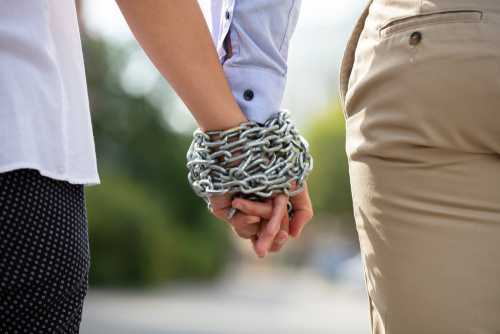Human beings have relied on each other for support in all its forms. Whether it’s an emotional, physical, or physiological need, we found it necessary to depend on our fellow humans for its fulfillment. And, we also know that this “arrangement” is a two-way street when approached in a healthy way.
So, what happens when one lane gets shut off? What happens when one person is constantly on the giving and the other on the receiving end? This is what we know today as “codependency”. It is a relatively common issue in relationships of every kind and it can have a significant impact on all the individuals involved.
The problem is, that impact is mostly negative. After all, when one person prioritizes the needs and desires of their partner over their own and at the expense of their own well-being, the whole relationship becomes detrimental to their mental and emotional health, as well as the health of the relationship itself.
Codependency can lead to a range of negative outcomes, including anxiety, depression, low self-esteem, and the feeling of powerlessness for the Giver, while effectively robbing both the Giver and the Taker of personal growth opportunities, often making a relationship dysfunctional and, even worse, a toxic one for all parties involved.
For these reasons, it is crucial to learn to recognize the signs of codependency, either on your own or at a professional workshop or retreat, as well as traits that may lead to it forming. By doing this, individuals can seek the help they need to break free from these unhealthy behavioral patterns, as well as other codependency and control issues, and develop healthier relationship dynamics, which will ultimately lead to a union that is only beneficial for both individuals.
What Are The Signs Of A Codependent Relationship?

There are many signs that might indicate that the relationship is codependent and, as such, require addressing either in the form of a workshop or retreat visitations, or codependency support groups near you. However, the operating word here is “might”.
Since this behavioral disorder is a relatively recent addition to modern psychology, its extent isn’t completely crystallized. Rather, it is often viewed in combination with other factors, such as personality traits, past experiences, childhood traumas, etc.
Additionally, it is important to recognize that noticing one or more of these signs doesn’t necessarily mean that the relationship is doomed. It only indicates that there are some issues that need addressing sooner rather than later in order to establish a good balance that will eventually lead to healthy dynamics.
Self-Sacrifice
This behavior is the hallmark of a codependent relationship. It is characterized by one person (the Giver) constantly sacrificing their own needs to please their partner, even at the expense of their own physical, mental, and emotional well-being.
In the advanced stages of codependency, they will begin sacrificing their personal values and beliefs to maintain the relationship, which ultimately leads to a loss of identity and an overwhelming feeling of being lost.
As time progresses, the Giver can feel like they’re stuck in a never-ending cycle of giving, without receiving anything in return. This constant feeling that their own needs aren’t being met or don’t matter at all, can eventually lead to exhaustion and resentment toward their partner.
Lack Of Personal Boundaries
In this instance, lack of boundaries refers to an overly heightened sense of responsibility for a partner’s emotions and actions. If a person views their own achievement solely through a prism of their partner’s happiness and success, they can begin experiencing a lack of individuality and independence, as well as lower self-esteem.
Codependents can have a constant need for approval from their partner, seeking validation and reassurance that they are loved and accepted. Given time, this need can become all-consuming and lead to an ever-increasing dependence on their partner.
Excessive Care-Taking And Rescuing
One person in the relationship has a tendency to excessively care for and rescue their partner, taking on an undue amount of responsibility for their partner’s overall well-being. This behavior can lead to a sense of obligation and dependence, where the other person feels like they can’t function without their partner’s constant support.
Enabling Behaviors
As a direct result of rescuing, one person can enable the other’s destructive behaviors, such as substance abuse or unhealthy coping mechanisms. This can further exacerbate the codependent dynamic, making it difficult for the codependent individual to break free to make room for change.
Self-Blame
Codependent individuals can have a tendency to take on responsibility for the other person’s problems, actions, or behaviors, even without any justifiable reason. This can lead to feelings of guilt and shame, further perpetuating the unhealthy relationship dynamic.
Difficulty Expressing
In a codependent relationship, one person may struggle to express their emotions or assert their needs. This behavior can lead to a lack of communication and understanding, as the other person might not be aware of their partner’s needs and desires, which the Giver can interpret like they’re being taken advantage of.
Fear Of Abandonment Or Rejection
Fear of abandonment or rejection is a common contributor to codependency forming, as it can drive individuals to cling to each other and avoid conflict. However, this can also lead to a lack of healthy communication and boundary-setting, as the individuals can feel like they have to constantly please their partner to avoid being abandoned. Fear can also make it difficult for the codependents to leave a relationship, even if it is no longer healthy or fulfilling and even if it is causing them harm.
Control Issues And Manipulation
Tying into the previous point, the same fear can trigger a strong need to control every aspect of the relationship. This can manifest in various ways, such as one person trying to micromanage the other person’s life or making all the decisions for the couple.
The tactics used here as means to an end are often guilt-tripping or other forms of psychological manipulation, which can further exacerbate the sense of powerlessness and lack of autonomy in a person on the receiving end.
Emotional Volatility
Codependent relationships are often marked by one person’s feelings dictating the mood of the entire relationship. These intense emotional highs and lows can lead to a sense of instability and unpredictability, making it difficult for individuals to establish healthy relationship dynamics.
Lack Of Trust
Eventually, all of the above factors can completely deteriorate the trust between partners, with one or both individuals struggling to believe (in) their other half. This can often lead to jealousy and possessiveness, as individuals can feel the constant need to monitor their partner’s actions and interactions with others.
What Is A Codependent Person Like?

A codependent person is often characterized by a set of traits and/or behaviors that contribute to the development of extreme dependency in a relationship. These traits include (but aren’t limited to):
- Low self-esteem: Feeling unworthy or undeserving of love and attention can lead a person to seek validation and approval from their partner.
- People-pleasing: Doing whatever it takes to make their partner happy and avoid conflict can lead to diffusing or complete loss of personal boundaries and an inability to assert one’s needs.
- Over-responsibility: Holding oneself accountable for the partner’s well-being may cause a person to take more responsibilities than is reasonable or necessary, leading to an inability to fulfill one’s own needs.
- Non-confrontational: Fearing that any conflict or disagreement will lead to the end of the relationship, can make it difficult for a person to express their feelings and assert their needs.
- Distrustful: Past experiences of betrayal or abandonment can often cause the codependent person to struggle to trust their partner or anyone else.
- Emotionally volatile: Intense emotional reactions to their partner’s behavior can leave a person feeling overwhelmed or even consumed by their own emotions.
- Perfectionist: Striving for flawlessness in their relationship and their own behavior can lead to feelings of inadequacy and a persistent sense of failure.
- Validation-seeking: Depending on their partner or others for the sense of self-worth can leave a person feeling that they are only valuable if they are needed by someone else.
- Indecisive: Relying on their partner or others to make choices for them often contributes to a loss of personal identity.
- Martyr complex: Sacrifice their own needs, dreams, and desires to please their partner often leads to a loss of personal identity and an unhealthy dependence on the other person.
It’s absolutely imperative to note that codependency resulting from or exacerbated by the above traits is by no means a matter of weakness or lack of willpower. It is a complex behavior that often develops as a coping mechanism in response to past trauma, societal pressures, or deep-seated insecurities.
As such, this issue must be approached with empathy and understanding above all, preferably with the help and guidance of a professional in a dedicated codependency retreat or workshop as, despite the complexity, this behavior can be effectively managed and even rooted out completely.
Choose PIVOT’s Codependency Workshops & Retreat For Future Freedom
Noticing any of the above signs in yourself, your partner, or your relationship as a whole is a great start! It means that you are willing to admit that you need help and start searching for codependency support groups near you. And the best thing about it is that you don’t have to do it alone!
Experienced relationship coaches at PIVOT are here to help you on your journey toward healing and self-discovery. Join one of our codependency workshops, held in a beautiful and peaceful Glass House retreat, and gain the tools and knowledge you need to build a healthier relationship.